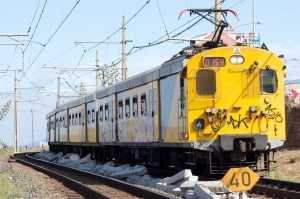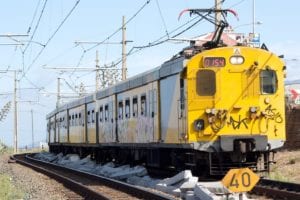 Commuter rail in Cape Town is on the brink of total collapse according to the City’s Mayoral Committee Member for Transport and Urban Development, Councillor Brett Herron.
Commuter rail in Cape Town is on the brink of total collapse according to the City’s Mayoral Committee Member for Transport and Urban Development, Councillor Brett Herron.
Herron said in a statement that the municipality intends to approach the National Department of Transport to expedite the assignment of the urban rail function to the City, pending Council’s approval by the end of this month.
According to Herron commuter rail numbers in Cape Town have fallen by 30% from 2015/16 to 2016/17 while the latest data received from Metrorail, indicates that there were on average 2.7 million fewer rail journeys in Cape Town per month in 2016/17 when compared with 2015/16.
“Commuters have been and are still fleeing from passenger rail as they cannot rely on the trains to travel to and from work,” he explained.
Herron cited punctuality and personal safety as two of the major concerns driving the public away from the service.
“Passenger rail is the backbone of public transport in Cape Town. More than half of all commuter journeys – that is 54% – are made by train. However, Metrorail’s data confirms that thousands of commuters have been displaced to road-based transport – be it private vehicles, minibus-taxis or buses – over the past two years,” Herron noted.
Catastrophic consequences
The risk that passenger rail in Cape Town could effectively collapse before the DoT’s National Rail Policy (draft White Paper) of June 2017 is finalised is very real according to Herron.
He believes that a collapse would be catastrophic for the city and the residents, and commuters who are already subjected to constant peak-hour grid-lock on the congested road network.
“The City cannot sit back and wait for the National Government to intervene. Time is of the essence,” he said.
“Should Council give us the go-ahead, we will present a business plan to the DoT in which we will propose to take over passenger rail in a structured and incremental manner,” he added.
Herron noted that the take-over must happen gradually so that the City can plan ahead, acquire the necessary skills, and develop the additional capacity to ensure the long-term sustainability of passenger rail.
 Commuter rail in Cape Town is on the brink of total collapse according to the City’s Mayoral Committee Member for Transport and Urban Development, Councillor Brett Herron.
Commuter rail in Cape Town is on the brink of total collapse according to the City’s Mayoral Committee Member for Transport and Urban Development, Councillor Brett Herron.






